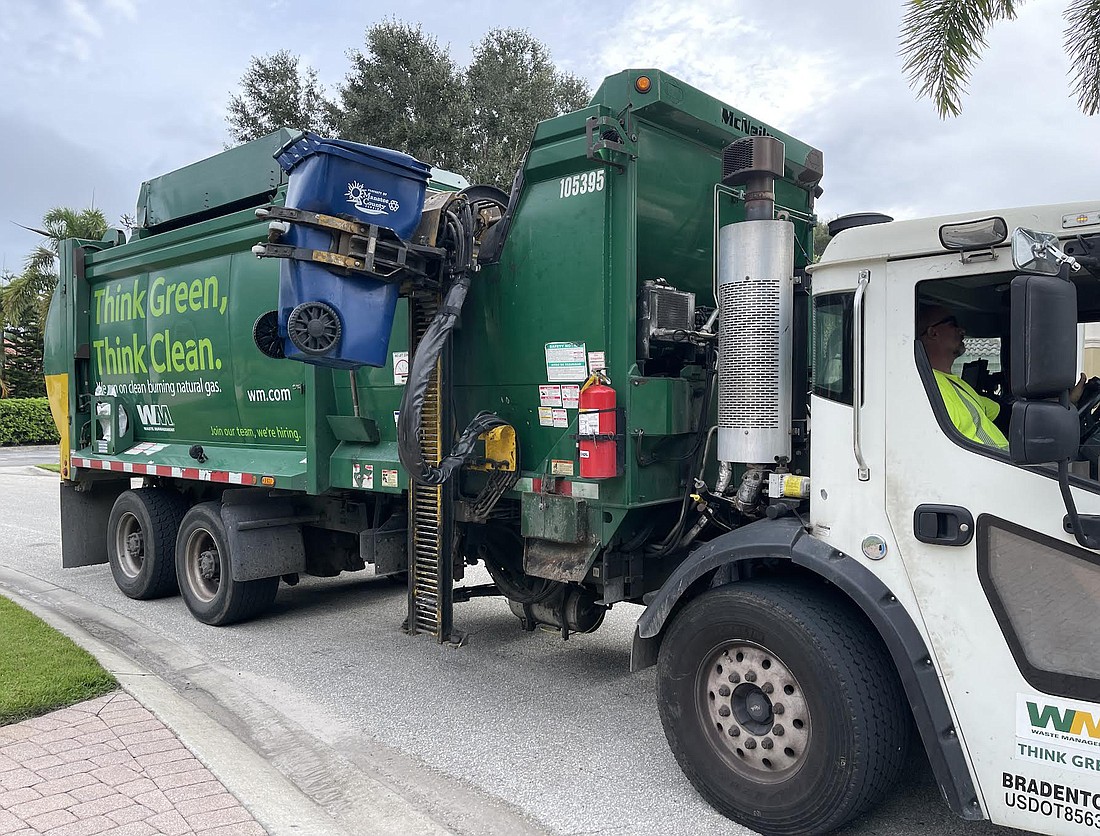- November 23, 2024
-
-
Loading

Loading
 Photo by Scott Lockwood
Photo by Scott Lockwood
With the town of Longboat Key's trash collection contract up for renewal, Waste Management is requesting a “higher-than-normal” increase.
At the town’s Feb. 20 workshop, Director of Public Works Isaac Brownman explained to commissioners that Waste Management is requesting a 28% increase in residential collection rates due to a variety of factors related to cost increases.
The contract renewal asks for a 28% increase in residential rates, from the current monthly rate of $17.56 to a proposed $22.60. That’s a difference of $5.04.
“With this renewal period, Waste Management has asked for higher-than-normal rate increases than what’s normally allowed for in our contract due to the inflationary pressures that have happened since essentially 2020,” Brownman said.
Waste Management, Inc. has been the town’s trash collection provider through contract agreements for the past 30 years.
The base term of the existing contract began on July 1, 2014, and lasted until June 30, 2021. That contract also allowed for two optional, three-year renewals, the first of which is up this summer.
An extension of the current level of service would go through June 30, 2027.
Waste Management collects trash twice a week on the island, on Mondays and Thursdays. Recycling is also picked up on Mondays, and yard waste on Wednesdays.
While some residents emailed commissioners with concerns over how the service affects roads, Town Manager Howard Tipton said this is something that can be looked at with the next contract.
“In terms of wear and tear on the road, there is some impact of these trucks running up and down the roads,” Tipton said. “We can look at that in three years, but our recommendation is based on the existing levels of service.”
With this new contract agreement, Brownman said staff negotiated the annual CPI increase down from 4% to 3%. He also said staff asked that the 3% increase is not added on the first term if the increased rates are approved, to which Waste Management agreed.
Brownman explained to commissioners that this rate increase is mainly being caused by increased costs for labor and maintenance.
Direct labor costs have increased about 26% since 2021, according to Brownman’s presentation. That accounts for things like increased costs searching for applicants and higher sign-on incentives, as well as wage increases.
Truck maintenance costs were also the other big factor attributing to the latest rate increase.
According to numbers provided by Waste Management, the cost to replace a tire on the trucks has increased 124% since 2020, from $811.11 to $1,008.91 in 2023.
Brake replacement for one set of brakes on one axle increased 185%, from $697.83 in 2020 to $1,291.64 in 2023.
The rolled steel needed to replace one floor on a truck body went from $1,900 in 2020 to $3,700 in 2023, which is a 194% increase.
Waste Management’s fleet doesn’t use diesel, but rather compressed natural gas. Those costs have also risen. Though it’s not the same as diesel, Waste Management calculates a diesel equivalent per gallon. That increased from $1.09 in 2020 to $1.79 in 2023.
Brownman said that he and his staff are satisfied with the level of service that Waste Management provides.
“They provide, in our opinion, quality, consistent and reliable service. This is based on not just our working relationship but also feedback we get from residents,” Brownman said.
In addition, he said past citizen survey results had high marks for the Waste Management service, with specific comments about how respectful the drivers are.
“There’s no question in terms of the service. … The question is the rate increase,” Brownman said.
Staff reached out to another trash collection provider, who confirmed that the industry is experiencing inflationary pressures.
Some commissioners asked Brownman and Waste Management staff if the lower operational costs during the off season was reflected in the rate.
Jason White, district manager for Waste Management Manatee, said the rate provided is “blended,” which means it would take into account factors like that.
Brownman also suggested that extending this contract would bring the industry three years further from the COVID-19 pandemic, which was a big factor in the increased costs. The time distance may help alleviate the costs, Brownman estimated.
Staff recommended that the contract be approved, and commissioners reached a consensus to move the contract approval to the March 4 regular commission meeting for formal action.